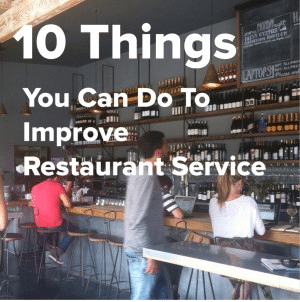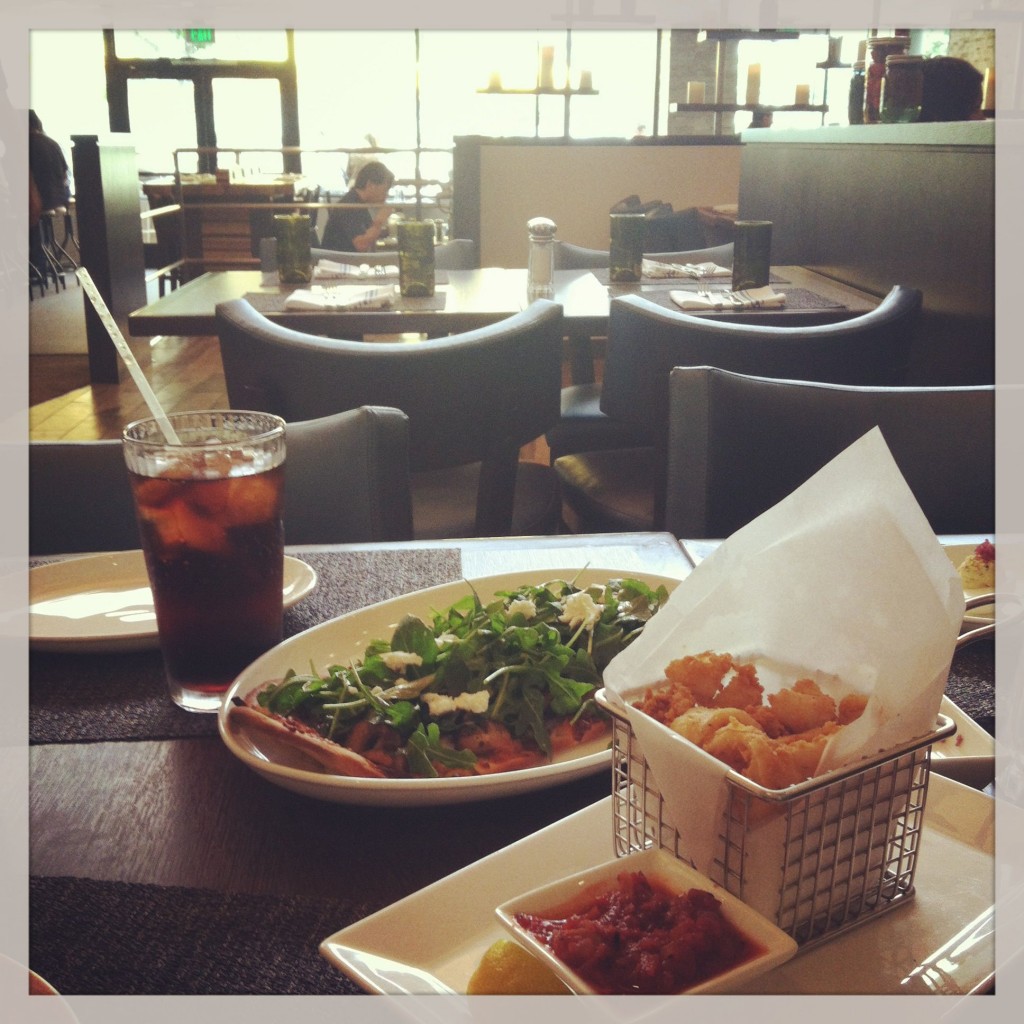
02 Jun 10 THINGS RESTAURANT OWNERS AND MANAGERS CAN DO TO IMPROVE SERVICE
THIS IS HOW TO IMPROVE SERVICE
Restaurants are built on two major principles: serve great food and give great service. Problem is, many restaurant owners fail to take the time to chart out what specifically they want their service to look and feel like or invest the funds to create a solid service program.
When things start to go off track, sales slump, and Yelp reviews get increasingly worse, that’s often when people at the top begin to wonder what they need to do. When things are going wrong with a business, many hope they can find a quick fix to a bigger operational problem.
It doesn’t matter if you are about to open a restaurant or have been up and running for years, asking for help from a hospitality consultant like can definitely speed up the process and make a positive impact on your bottom line (just ask my clients!). But beyond a shot in the arm from an inspiring workshop or coaching session, restaurant owners and managers need to take a long-term commitment to working hard on daily maintenance of hospitality principles with their staff.
Here are the top 10 things I suggest restaurant leaders consider when wanting to improve their customer service and hospitality programs.
1. Get clear on what great service looks like for your restaurant and write it down.
Many restaurants operate without service training guidelines or employee handbooks that include service guidelines. Though having a service manual for a small café or mom and pop restaurant may seem unnecessary, keep this in mine: a restaurant without a service handbook is like a football team without a set of plays.
A thorough manual that states clear service goals, steps of service, and performance expectations is integral in the teaching process of instilling a consistent philosophy of service.
If you don’t write down what you want from your staff, your goals and expectations are unclear. If you have ever thought “they should know what their job is,” you are experiencing proof that the people who work for you probably don’t know what’s expected of them.
Employees who aren’t given clear guidelines or top priorities for their job position are left to assume what is expected of them based on their past experiences. Even though the concept of waiting tables is very familiar, how a corner café defines the position is much different from the four-star, fine dining Italian restaurant. Assuming that people know what their jobs should be is a recipe for bad service.
2. Give your team the tools that they need.
Look, every restaurant runs out of inventory items. But a restaurant that consistently operates without basic tools is a restaurant with big problems on the horizon. A restaurant without enough silverware, plates, glassware, or food and beverage inventories will continue to experience decreased sales, sloppy performance, increased risk of health department violations, theft, and poor training of new hires and current employees.
When employees don’t have the tools that they need to give great service, they are forced to cut corners, lie or make excuses to guests, and work twice as hard for decreasing results. The staff of a restaurant without a consistent inventory loses faith in the organization and forces them to stop caring about being professional at their job.
3. Great Service Doesn’t Happen Overnight. There are no fast fixes.
Building a culture of hospitality isn’t something that just happens right away. Pep talks and impassioned speeches help, but not if goals and encouragement is offered once a year or once a quarter.
If you decide to invest in getting help from a hospitality consultant like me who can inspire your team and get them heading onto the right path of service, you will still need to keep up with daily maintenance of your service staff.
Great hospitality is grown in an organization and nurtured over time. Nothing in service is ever “fixed”. Just like weeds, service issues pop up over and over again. That’s why you need to:
4. Teach Service Every Day.
It’s important to lead and inspire your staff to focus on and improve performance issues on a daily basis. Some managers believe if they write a memo about service concerns and post it on the employee bulletin board, they have effectively communicated service expectations. Unfortunately, single missives are not enough to enforce service goals. Just because something is covered once in a pre-shift meeting or put in a memo doesn’t mean that service issues will be immediately resolved.
Great service is grown; hospitality requires daily attention and coaching.
When you work to improve a particular area of service you can expect a slow and steady change to occur. But even after that area of service is improved it will need to be revisited and nurtured. If you stop focusing on that area of service, within a few months you will find that the problem has returned. Remember, it takes 21 days to create a habit, and probably about 21 days to slip back into an old one.
5. Hire people with a heart for hospitality
When hiring, try looking beyond the resume for great people. Experience is great, but a heart for hospitality can be even more important than a specific amount of experience in a similar restaurant to yours. Be willing to let go of pre-conceived notions about what makes a great employee (specific number of years in a particular position, prior experience at similar type of restaurant) and stay open to the passionate folks and people with a deep-rooted ability to deliver kind and generous service. Basic job requirements can be taught. Having a heart for hospitality is something that’s inside the individual and in their internal wiring.
Some of the best employees I have ever hired came to me with resumes that weren’t “perfect” but had big hearts, tons of passion, determination to learn, commitment, and an innate kindness that resulted in extraordinary service.
6. Write out a training plan and expectations for every position at your restaurant.
When employees train one another without any clear guidelines, the results are often less than stellar. When employees train other employees without guidelines, a kind of service folklore is developed and the training constantly changes.
7. Give great service to your staff so your staff can give great service to your guests
When employees know what is expected of them, have what they need to do their jobs, and feel their managers have their back, staff will commit to almost anything a business is trying to accomplish. A culture of hospitality thrives in a workplace where the staff feels appreciated and supported. Hospitality dies in a culture of fear.
It’s hard to give great service when you are constantly being yelled at or berated. If you are looking to improve sales and staff retention, consider leading with kindness rather than with frustration and anger. When staff fears an angry tirade, the cold shoulder, or passive aggressive comments from their leaders it becomes very difficult to maintain a heart of hospitality. Fear breeds mistrust and kills teamwork.
Take a look at how you lead your team. Do you lead through encouragement or through negative feedback? Robert Greenleaf, the business thinker who popularized the philosophy of the servant leadership wrote, “If there is a flaw in the world to be fixed, it must start inside the leader.”
8. Reward your team for great performance. Create an employee rewards program.
If you are looking for ways to innovate or uplift your service program, start by getting creative with how you motivate your staff. Successful food businesses like Starbucks, Chipotle, Zingerman’s, Shake Shack and any of Danny Meyer’s other restaurants, have developed ways to inspire their teams to do more than just bring in a paycheck. They have invested time and effort in treating their employees like they are their customers, which in turn makes employees care so much about their work, they act as if they were partners in the business.
Many restaurant owners and managers believe that employment and tip money coming in is reward enough for their front of house staff. Though many of these businesses do succeed, employees who are treated like replaceable commodities act like replaceable widgets.
Asking your staff to hit sales goals is one way of measuring improvements, but it does not answer the question “What’s in it for me?”
A pat on the back, service support, and kind words go a long way with staff, but what goes even further is kindness and generosity. Get creative. One restaurant I worked for gave gift certificates and frequent flier miles to staff members who racked up a significant number of unsolicited compliments from guests. Set up a gift card exchange with neighboring businesses. Not only will you improve your employee’s morale, but you will also begin a great conversation about rewarding your staff’s performance with other neighboring businesses and improve your restaurant’s influence on your community.
9. Empower your team to go the extra mile for guests.
Encourage and support your team to recognize service opportunities and give them the tools they need to make a difference with guests. Organizations that build trust and respect with their employees have the rare opportunity to create extraordinary experiences for guests and to build customers for life.
When you teach your team basic parameters of what “going the extra mile” means for your business, you can let your staff get creative, be problem solvers, and make a positive impact on your business.
10. Get Inspired. Share your inspiration.
Be a student of great service. Go out to dinner at a little hole-in-the-wall or a big restaurant. Take notes as you experience their service styles. Shop at stores that offer great service. What aspects of service worked for you? What style points could you learn from? What moments of great hospitality can you share with your staff and duplicate at your own restaurant?
Though there are plenty of things that restaurant owners and managers can do to improve the hospitality programs of their restaurant and turn bad customer reviews around, there aren’t quick fixes. Hospitality must be something that’s developed and nurtured over time.



